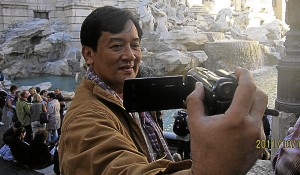Indies’ world view is Pinoy view
Some kind of guru
“Let’s keep making movies that are reflective of our culture. This way, we are able to promote the country,” said Roxlee, filmmaker, cartoonist, painter and considered the pioneer in independent film animation in the country.
Roque Federizon Lee was born to parents Chit Lee and Fortuna Federizon in Naga, Camarines Sur, on Aug. 16, 1950. He attended Naga Elementary School and finished high school at the Ateneo de Naga University. He earned his architecture degree from the National University in Manila.
“I was part of the school paper in high school. I drew illustrations for poems and essays. I guess that’s where it all began,” he told the Inquirer in a previous interview. Moving to Manila in the ’70s, Roxlee started contributing drawings to Jingle Chordbook Magazine. These drawings, which included comic strips with original characters, stood out for their grotesque style and absurd humor.
Roxlee’s works appeared regularly in Jingle, where he became a cult figure, along with a talented bunch of artists including Dante Perez, Ludwig Ilio, Dengcoy Miel and Benjie Lontoc.
In 1981, the cartoon strip “Cesar Asar,” a collaboration between Roxlee and his brother Monlee debuted in a daily broadsheet.
Roxlee said Cesar, main character of the strip, is inspired by a childhood friend with the same name: “He sports a mustache, like the character. He’s also a prankster.” A movie version of “Cesar Asar,” featuring live actors, was made a few years later.
Roxlee is one of the founding members of Animagination, which has evolved into Animahenasyon, and Sinekalye, a group of filmmakers taking films and music to the streets.

NICK Deocampo at the Trevi Fountain in Rome, where “La Dolce Vita” was shot.courtesy of nick deocampo
Roxlee’s animated films in the 1980s helped lay the groundwork for today’s vibrant indie animation scene, noted Teddy Co, cinema committee member of the National Commission for Culture and the Arts.
His “12 commandments of filmmaking” has turned him into some kind of guru, an inspiration to filmmakers young and old, added Co.
Roxlee’s early works—done in super-8 film—like “The Great Smoke,” which was hand-drawn, and “Juan Gapang” with pixilated live action pieces, are now considered classics. In 2000, he reinvented himself as a digital filmmaker.
Roxlee’s works include “Juan Gapang and Prayle” (1988), “Tito’s Wedding” (1994), “Bruce” (2002), “Batumbuhay” (2003), “Romeo Must Rock” (2005), “La Pula,” a short film he made for “ImaheNasyon” (2006)— an omnibus depicting the Edsa Revolution in different points of view, and “Juan Baybayin” (2007).
He recently released the book “Cesar Asar in the Planet of the Noses,” a collection of his cartoons and short stories.
In 2010, Roxlee was given the Lifetime Achievement Award at the 4th Animahenasyon Philippine Animation Film Festival.
He counseled artists not to be always focused on the technical aspect of their work: “[You] should also be concerned with content. Work hard on improving your scripts. This will make watching your work worthwhile.”Marinel R. Cruz
He wears many hats
Filmmaker Nick Deocampo has ventured into other arenas— from book publishing to scholarship and film literacy—all in the service of cinema and social change.
“I would like to think that my contributions have far exceeded mere acts of film production,” he points out. “They’ve also encompassed social mobilization in spreading the art and practice of independent cinema at a time when the atmosphere was inhospitable.”
In the late 1970s, he organized workshops and film festivals “right under the nose of the dictatorship.” Bayani San Diego Jr.
Act of subversion
But prior to wearing many hats as historian, author, scholar, programmer and teacher, Deocampo was a filmmaker. He asserts that he makes films “as a reaction to the world I live in.”
He notes, “As writers write, dancers dance, and singers sing, I make films to register my emotional and intellectual responses to things that happen around me.”
Deocampo regards filmmaking as a personal act of subversion. “Growing up as a homosexual, I took a stand … giving my films a gay perspective that shaped both the poetics and politics of my films vis-à-vis a culture of machismo and patriarchy.”
He describes his filmography as “damning documents of a life lived under social repression.” His mission was to record the discontent in the collective memory. “I had an unwavering commitment: Those who watched my films would not forget the past.”
For his daring and determination, he has been abundantly rewarded here and abroad.
In the years between martial law and the Edsa revolution, Deocampo crafted a trio of films— “Oliver” (1983), “Children of the Regime” (1985) and “Revolutions Happen Like Refrains in a Song” (1986)— that reflected the mood and madness of the times and won the grand prize at the Brussels fest in 1989.
Also in Brussels, he won for the docus “A Legacy of Violence” in 1990 and “The Sex Warriors and the Samurai” in 1995. “Sex Warriors” also brought home the Special Mention honor from a Tokyo fest in 1996.
In 1994, he won best short at the Fribourg fest for “Memories of Old Manila.” Three years later, he won the audience prize at the Yamagata International Documentary Festival in Japan for “Private Wars.”
He has served as juror in various international film festivals—from Berlin to Hawaii, from New Delhi to Bilbao, from Rotterdam to Brisbane.
A recipient of the Ten Outstanding Young Men of the Philippines in 1992, Deocampo headed the Mowelfund Film Institute, which trained some of the most acclaimed filmmakers of the new generation. He also taught Film at the University of the Philippines and De La Salle and Ateneo de Manila Universities.
As film scholar, he helped repatriate the prewar film “Zamboanga” after his research at the US Library of Congress in Washington DC.
He continues his work as pedagogue with the Center for New Cinema (CNC), which he established in 2008.
Film literacy programs
With CNC, he has teamed up with mall giant SM Cinemas and the Department of Education, in presenting film literacy programs to high school and college students. “It’s my way of contributing to audience development,” he explains.
Deocampo authored the landmark books “Short Film: Emergence of a New Philippine Cinema” and “Beyond the Mainstream: The Films of Nick Deocampo.”
In the works is a five-volume history of Philippine cinema, beginning with “Cine: Spanish Influences on Early Cinema in the Philippines.”
For “Beyond the Mainstream” (1997), “Cine” (2003) and “Sinegabay: The Film Study Guide” (2008), he won the National Book Award from the Manila Critics’ Circle.
He plans to release the second installment of the history series, “Film: American Influences on Philippine Cinema,” next year. “It’s a product of more than 30 years of research. Accompanying the project is a 10-hour video docu series. It contains 3-D animation with interviews and excerpts from classic Filipino movies.”
He perseveres in the realm of cinema, as a multitasking multihyphenate, he says, “to add new perspectives in the way the world is seen. Beyond being mere acts of self-expression, my films seek to engage viewers into seeing the world anew and, in allowing the ventilation of multiple views, create a world of tolerance.”
